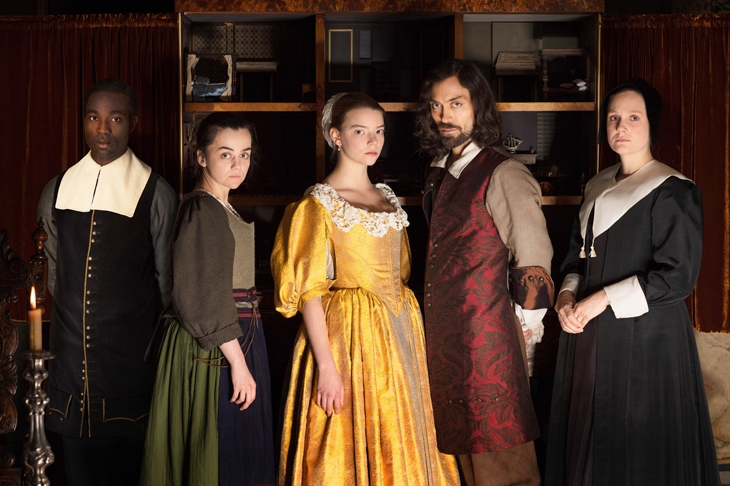BBC1’s The Miniaturist (26/7 December) is a lavish two-part adaptation of Jessie Burton’s bestseller. It’s also further proof that almost any geographical and historical setting can be conscripted to tell us what’s apparently the only story we’re interested in these days: an alliance of plucky and unfailingly virtuous black people, gay people and women taking on the repressive forces of straight white blokes.
The main character, Nella (Anya Taylor-Joy), is ostensibly a young 17th-century Dutchwoman who’s been married off to a rich Amsterdam merchant. On closer inspection, though, she turns out to be a 21st-century feminist who’s somehow been transported back in time to show our benighted forebears the error of their patriarchal ways.
At first, admittedly, it seems as if the programme will be a straightforward mix of Rebecca and Girl with a Pearl Earring, as Nella walks timidly through a series of immaculate Dutch interiors (cue those black-and-white tiled floors), while being alternately frowned at and rebuked by her husband’s Mrs Danvers-like sister, Marin. Nella’s mousiness, however, doesn’t last. Before long, she’s befriended a kindly black servant and a feisty maid, informed her husband that ‘I want to be your wife [not] just someone you own, like a dog’, and begun to show an increasingly shrewd understanding of the international sugar trade. As part of her stand against bigotry in all its forms, she even gets the puritan Marin (Romola Garai) to realise there are more important things in life than God — female solidarity for one.
The obvious trouble is that, whereas Marin manages to shake off her irritating piety, the programme itself never does. The Miniaturist is always lovely to look at and the cast are uniformly good, despite too often having to deliver lines of slightly portentous, viewer-nudging dialogue. Nonetheless, the overall result makes you pine for a TV drama that examines our received wisdoms, rather than merely finding another — and, in this case, frankly improbable — way of reciting them.
And (Radio 4-style link alert) speaking of improbable, having read Grandpa’s Great Escape to my children earlier this year, I can confirm that the TV version (BBC1, 1 January 2018) doesn’t take any liberties with David Walliams’s original book. The plot really is that bonkers — and all the more so for taking place not in some fantasy world, but in an otherwise carefully evoked 1980s Britain (cue Rubik’s Cubes and Duran Duran). At the same time, I can also confirm that children don’t seem to mind, or even notice, the wild implausibility of, say, lots of elderly people escaping from an old folks’ home by abseiling down a high tower on a rope of knickers. Or a senile former RAF pilot breaking into a war museum, stealing a Spitfire, filling it up with fuel at a nearby petrol station and triumphantly heading into the skies.

David William’s in Grandpa’s Great Escape
But with Williams as the co-adapter (and a member of the cast), the programme wisely follows the book in simply serving all this stuff not just straight, but with a level of shameless gusto that surely only the grumpiest of grown-ups will be able to resist. And even they might find themselves mollified by the programme’s touching respect for Battle of Britain pilots.
Finally, with BBC1’s Ordeal by Innocence pulled because of the allegations against Ed Westwick, the unexpected keeper of the Agatha Christie flame this Christmas is Channel 5 with Crooked House (17 December).
In fact, this is a film that’ll be released in cinemas next year — which may explain why the traditional Christmas phrase ‘all-star cast’ here refers to actors even starrier than the likes of Philip Glenister and Olivia Colman. Glenn Close, for example, provides melancholy evidence that she’s now graduated to playing old battle-axes; Mad Men’s Christina Hendricks perhaps fails to extend her range, by portraying a breathy siren in a tight dress; Gillian Anderson gives it the full drunken vamp with some help from a black wig.
All their characters are members of an extended 1950s family living together in a country house where the atmosphere has long been poisoned by a patriarch who’s now been poisoned himself. And for quite a long time, that’s more or less that. Having set up the central relationships, the film does a fine job of continuing to remind us just how uneasily these people get along. It also contains enough anachronisms — including a Times front page that doesn’t consist of classified ads — to keep the pedants happily unhappy. Even so, after a while you can’t help noticing that, rather unusually for a Christie adaptation, not a great deal is happening plot-wise, with the programme not so much gripping us as drifting pleasantly by.
The solution, when it comes, is duly both shocking and satisfying. Yet I suspect I mightn’t be the only viewer who wishes it had come a bit sooner.





Comments